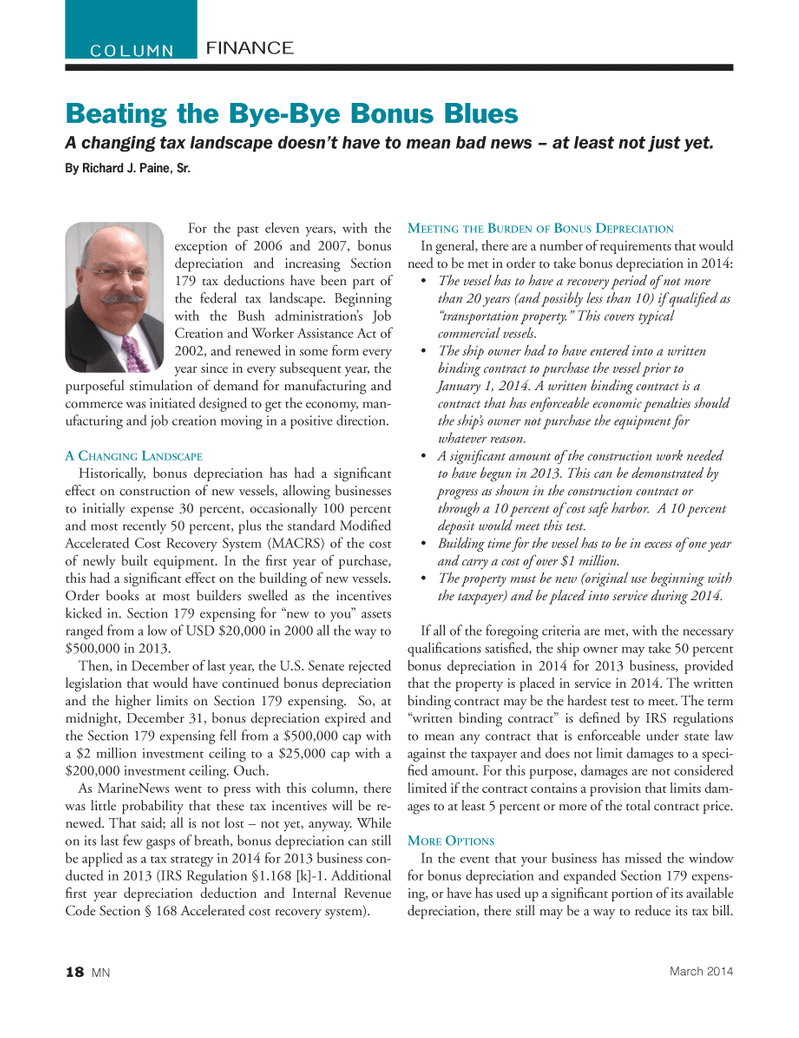
Page 18: of Marine News Magazine (March 2014)
Fleet & Vessel Optimization
Read this page in Pdf, Flash or Html5 edition of March 2014 Marine News Magazine
For the past eleven years, with the exception of 2006 and 2007, bonus depreciation and increasing Section 179 tax deductions have been part of the federal tax landscape. Beginning with the Bush administration’s Job
Creation and Worker Assistance Act of 2002, and renewed in some form every year since in every subsequent year, the purposeful stimulation of demand for manufacturing and commerce was initiated designed to get the economy, man- ufacturing and job creation moving in a positive direction.
A CHANGING LANDSCAPE
Historically, bonus depreciation has had a signifi cant effect on construction of new vessels, allowing businesses to initially expense 30 percent, occasionally 100 percent and most recently 50 percent, plus the standard Modifi ed
Accelerated Cost Recovery System (MACRS) of the cost of newly built equipment. In the fi rst year of purchase, this had a signifi cant effect on the building of new vessels.
Order books at most builders swelled as the incentives kicked in. Section 179 expensing for “new to you” assets ranged from a low of USD $20,000 in 2000 all the way to $500,000 in 2013.
Then, in December of last year, the U.S. Senate rejected legislation that would have continued bonus depreciation and the higher limits on Section 179 expensing. So, at midnight, December 31, bonus depreciation expired and the Section 179 expensing fell from a $500,000 cap with a $2 million investment ceiling to a $25,000 cap with a $200,000 investment ceiling. Ouch.
As MarineNews went to press with this column, there was little probability that these tax incentives will be re- newed. That said; all is not lost – not yet, anyway. While on its last few gasps of breath, bonus depreciation can still be applied as a tax strategy in 2014 for 2013 business con- ducted in 2013 (IRS Regulation §1.168 [k]-1. Additional fi rst year depreciation deduction and Internal Revenue
Code Section § 168 Accelerated cost recovery system).
MEETING THE BURDEN OF BONUS DEPRECIATION
In general, there are a number of requirements that would need to be met in order to take bonus depreciation in 2014: The vessel has to have a recovery period of not more than 20 years (and possibly less than 10) if qualifi ed as “transportation property.” This covers typical commercial vessels. The ship owner had to have entered into a written binding contract to purchase the vessel prior to January 1, 2014. A written binding contract is a contract that has enforceable economic penalties should the ship’s owner not purchase the equipment for whatever reason. A signifi cant amount of the construction work needed to have begun in 2013. This can be demonstrated by progress as shown in the construction contract or through a 10 percent of cost safe harbor. A 10 percent deposit would meet this test. Building time for the vessel has to be in excess of one year and carry a cost of over $1 million. The property must be new (original use beginning with the taxpayer) and be placed into service during 2014.
If all of the foregoing criteria are met, with the necessary qualifi cations satisfi ed, the ship owner may take 50 percent bonus depreciation in 2014 for 2013 business, provided that the property is placed in service in 2014. The written binding contract may be the hardest test to meet. The term “written binding contract” is defi ned by IRS regulations to mean any contract that is enforceable under state law against the taxpayer and does not limit damages to a speci- fi ed amount. For this purpose, damages are not considered limited if the contract contains a provision that limits dam- ages to at least 5 percent or more of the total contract price.
MORE OPTIONS
In the event that your business has missed the window for bonus depreciation and expanded Section 179 expens- ing, or have has used up a signifi cant portion of its available depreciation, there still may be a way to reduce its tax bill.
Beating the Bye-Bye Bonus Blues
A changing tax landscape doesn’t have to mean bad news – at least not just yet.
By Richard J. Paine, Sr.
FINANCE
COLUMN 18 MN
March 2014
MN MAR14 Layout 18-31.indd 18 2/21/2014 3:21:07 PM

 17
17

 19
19
